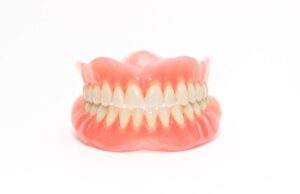
Dentures are designed to restore your smile, improve speech, and make eating easier after tooth loss. However, when dentures don’t fit properly, they can cause far more harm than good. Ill-fitting dentures not only affect your comfort but can also lead to serious oral health problems if left unaddressed. Here are 5 common complications of poorly fitting dentures and why it’s important to have them adjusted by your dentist.
1. Painful Sores and Irritation
One of the earliest signs of ill-fitting dentures is discomfort or soreness in the gums. When dentures shift or rub against your soft tissues, they create friction, which can lead to raw spots, blisters, and painful ulcers. These sores may become infected if not treated promptly. Over time, persistent irritation can make it difficult to wear your dentures at all. If you notice red or tender areas in your mouth, see your dentist right away for an adjustment or relining.
2. Difficulty Eating and Speaking
Well-fitted dentures should allow you to eat and talk naturally. When they’re loose, however, chewing can become challenging and even painful. You may find yourself avoiding certain foods or struggling to pronounce words clearly. Some patients also experience dentures slipping or clicking while talking, which can be embarrassing. These issues are not only inconvenient but can affect your nutrition and self-confidence. Properly fitted dentures help you chew efficiently and speak with ease.
3. Bone Loss and Facial Changes
One of the most serious long-term effects of ill-fitting dentures is jawbone loss. When dentures don’t fit snugly, they fail to provide even pressure across your gums and underlying bone. This uneven pressure accelerates bone resorption, the natural process of bone shrinking when teeth are missing. As the bone deteriorates, it changes the shape of your jaw and face, leading to a “sunken” appearance and causing dentures to fit even worse over time. Regular adjustments and relines can help slow this process.
4. Infections and Inflammation
Loose dentures create small gaps where food particles and bacteria can accumulate. This trapped debris can lead to gum inflammation, bad breath, and oral infections such as stomatitis or candidiasis (a yeast infection). In severe cases, infection can spread to deeper tissues and become painful. Maintaining excellent oral hygiene—cleaning both your dentures and gums daily—along with ensuring a proper fit, can significantly reduce your risk of these complications.
5. Digestive and Nutritional Problems
If dentures make chewing difficult, you may avoid healthy foods like fruits, vegetables, and proteins in favor of softer, processed options. This can lead to poor nutrition and digestive issues, since food that isn’t properly chewed is harder for your stomach to break down. Comfortable, secure dentures allow you to maintain a balanced diet and enjoy mealtimes without discomfort.
Ill-fitting dentures are more than just an inconvenience—they can cause pain, infections, bone loss, and overall health problems. If your dentures feel loose, slip frequently, or cause sore spots, don’t ignore the issue. Schedule a visit with your dentist for a reline, adjustment, or replacement. A well-fitted pair of dentures will not only restore your smile but also help you eat, speak, and live comfortably again.
About the Practice
Here at Advanced Smile Design, we have a reliable and lifelike solution for replacing missing teeth with dentures. Our prostheses are made with durable and natural-looking materials, and our advanced and precise technology allows us to provide more precise treatment. Want more good news? We accept insurance and have financing options as well, so you’re not worried about costs. Ready to get started? Head to our website to schedule your appointment or call our Willow Grove office at (215) 659-3334.

